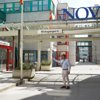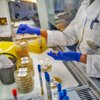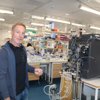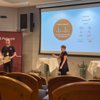Fritextsökning
Artiklar per år
Innehållstyper
-

Ingrid Lönnstedt: What does the p-value mean?
The smaller the better, and preferably smaller than 0.05. A p-value smaller than 5% means that the treatment effect is statistically significant at 5% significance level. But what does that mean? Read Ingrid Lönnstedt´s column to learn more.
-

Event om biologiska läkemedel fyllde tio
Under torsdagen förra veckan arrangerades Life Science Swedens event New Horizons in Biologics & Bioprocessing för tionde gången.
-

Samuel Lagercrantz: We are currently seeing medical breakthroughs in these areas
Samuel Lagercrantz, Editor in Chief of Life Science Sweden, lists three medical fields in which we are currently seeing major breakthroughs and two fields in which we can see some long-awaited positive developments.
-

Avancerade terapier på frammarsch – ”Utmaningarna är stora”
Utvecklingen av läkemedel för avancerad terapi sker snabbt och runt om i landet startas nu flera centrum för att tillgängliggöra den nya läkemedelsgruppen. Möjligheterna är enorma men utmaningarna är också stora.
-

Anna Törner: The clinical trial – Periscope to reality
What happens to the patients in the clinical trial is not very interesting, writes Anna Törner in a column.
-

A vaccine the world is waiting for: “It can change the lives of many”
A Solna laboratory is developing a vaccine that could save the lives of countless children in low- and middle-income countries. “Working on something that can make a difference for many people is important to me,” says Christine Hägglund, Laboratory Manager.
-

Business Sweden: “Companies have a lot to offer in data-driven precision medicine”
Data-driven precision medicine can potentially solve major healthcare problems, states Business Sweden in a new report on the subject.
-

Ett vaccin som världen väntar på: ”Kan ändra livet för många”
I ett laboratorium i Solna utvecklas ett vaccin som, om allt går i lås, kan rädda otaliga barns liv i låg- och medelinkomstländer. ”Det är viktigt för mig att jobba med något som kan göra skillnad för många”, säger labbchefen Christine Hägglund.
-

The art of building a biologic drug
The first biosimilar from Xbrane Biopharma was launched earlier this year, and several more are under development at the company’s facility in Solna, Sweden. “We do everything in-house ‒ from DNA fragments to a final process,” says David Vikström, Chief Technology Officer at the company.
-

Astra Zeneca avbryter studier i sent kliniskt skede
Astra Zeneca har beslutat att avbryta två fas III-studier som prövar läkemedlet Lokelma som behandling av hyperkalemi inom det kardiorenala spektrumet.
-

The Swedish innovation model: “There is a paradox”
It is often said that Sweden is strong when it comes to innovation, but how well are we turning that innovation into actual medicines?
-

Den svenska innovationsmodellen: “Det finns en paradox“
Det talas ofta om att Sverige är starkt när det kommer till innovation. Men hur väl förvandlar vi den innovationen till faktiska läkemedel?
-

The Swedish Academy of Sciences: “We have too many researchers”
Sweden does not need more researchers, but it does need better ones. According to the Royal Swedish Academy of Sciences, funding should be distributed to favour excellence.
-

Founder of Bioarctic, Lars Lannfelt, is honoured: “I want to create something for the future”
It´s like a scientist’s dream: to be the world’s first with a drug that genuinely affects one of our major diseases. Lars Lannfelt and his company Bioarctic have achieved just that, and they are thus making a significant contribution to the history of Swedish medicine. He is now being awarded the Research!Sweden Award 2023.
-

“A major energy boost for the entire cancer vaccine field”
The development of cancer vaccines has accelerated in recent years. Norwegian Ultimovacs is one of the companies attempting to develop a new type of treatment line for cancer patients, and the company recently presented positive data from a phase II study.
-

High-tech companies are increasingly focusing on health
Tech companies have been taking an interest in healthcare for many years, and this interest seems to be increasing. “It’s not a sudden shift in trend, it’s more about them advancing their positions,” says Anna Lefevre Skjöldebrand, CEO of Swedish Medtech.
-

“You discover one thing – and then 10 new questions arise”
COVID-19, diabetes, heart disease, and the impact of dog ownership on humans are just some of multitasker Tove Fall’s areas of research. However, her current focus is on her next field: the role of gut flora in human health.
-

Event sammanförde svenska och europeiska aktörer
Ett svenskutvecklat test för prostatacancer väckte nyfikenhet när Fokus Patient arrangerade event i dagarna tre.
-

Positiva röster om nya förslagen kring forskningsfinansiering
I onsdags lades en ny utredning fram med förslag om att i grunden förändra dagens struktur för finansiering av forskning. Life Science Sweden har pratat med flera branschföreträdare som ser positivt på förslagen.
-

The physician at the tech giant: “Observations in the emergency room made my mind up”
When Nasim Farrokhnia was in third grade at school in Tehran, the capital of Iran, her father gave her a book about Marie Curie, which soon became her favourite book. Perhaps her interest in science was born there and then, as science and new technology have since been a constant feature of her working life. Today, she is a Healthcare Manager in Microsoft’s Western Europe team.
-

Patienten i fokus på konferens
På måndagen drog konferensen Fokus Patient i gång i Bonnierhuset i Stockholm. Mötet pågår i tre dagar och kretsar kring personcentrerad vård, cancer och transplantationer.
-

”Man upptäcker en sak – och så dyker det upp tio nya frågor”
Covid-19, diabetes, hjärtsjukdom och hundägandets påverkan på människan är några av mångsysslaren Tove Falls forskningsområden. Men just nu ligger fokus på nästa spår: tarmflorans betydelse för människans hälsa.
-

Rickard Sandberg on this year’s Nobel Prize in Medicine: ”A key discovery”
The discovery that paved the way for the development of todays mRNA vaccines is the basis for this year’s Nobel Prize in Physiology or Medicine.
-

The first drugs to slow down Alzheimer’s – but what does it mean for patients?
New treatments for early Alzheimer’s are bringing hope to thousands of patients and their families. The question is, who will get the treatment, how will the right patients be found in time, and will the healthcare system’s resources be sufficient? Life Science Sweden has spoken to Swedish researchers in Alzheimer’s who voice cautious hope but also see further challenges.